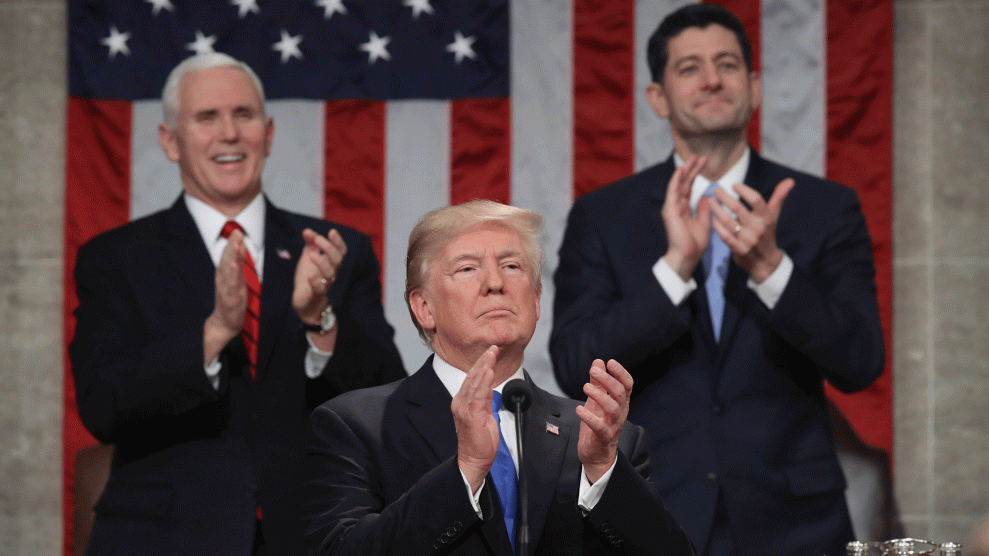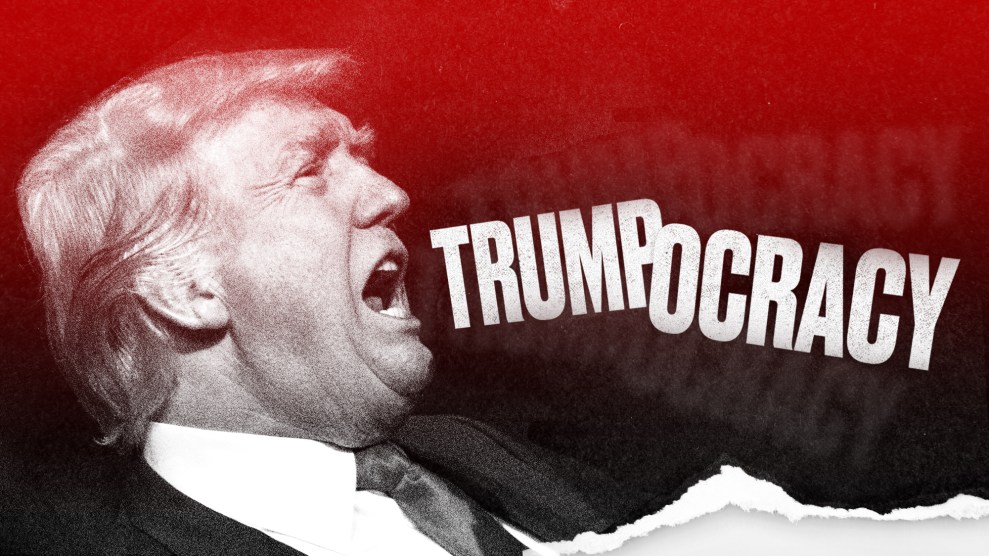
Win McNamee/AP
Despite Donald Trump’s recent statement that he is looking forward to being interviewed “under oath” by Robert Mueller, it’s long been clear that the president has been involved in an all-out effort to sabotage the special counsel’s sprawling investigation into Trump-Russia matters. We know that Trump ordered his White House counsel to fire Mueller just weeks after Mueller was appointed, that he pressured Attorney General Jeff Sessions to shut down the probe, and that he has openly attacked DOJ and FBI leaders as corrupt.
In Tuesday night’s State of the Union address, Trump gave two conspicuous signals that he will continue to do everything in his power to fight Mueller—including trying to grab more power. Not long into his speech, Trump uttered a chilling line: He called on Congress to give his White House the authority to summarily fire any federal employee deemed to “undermine the public trust, or fail the American people.”
Trump did so under the cover of talking up the need for better veterans care and praising his administration for already removing “more than 1,500 VA employees who failed to give our veterans the care they deserve.” But following days of intense and rapidly escalating political battle over a controversial memo from House Republicans aimed at giving Trump cover from the Mueller probe, the broad meaning of Trump’s proclamation was unmistakable. He basked in an applause line about giving “accountability and respect” to “our wonderful heroes, our veterans.” Then he continued:
So tonight I call on Congress to empower every cabinet secretary with the authority to reward good workers and to remove federal employees who undermine the public trust, or fail the American people.
As Yascha Mounk writes in Slate, “Under Trump’s proposal, any Cabinet secretary could decide that, say, a law enforcement official investigating the president had ‘undermined the public trust’ or ‘failed the American people’—and fire him on the spot. In other words, Trump is calling for an end to any semblance of independence for the IRS, the FBI, the Department of Justice, or any other federal agency.”
Congress is very unlikely to comply with such a proposal. But the president’s call to put career civil servants under the thumb of unilateral executive power continues a prolific pattern of budding authoritarianism from Trump that I’ve tracked closely since the day he was sworn in. In that light, Trump’s words, coming in such a high-profile speech, are stark.
Another telling moment came as Trump exited the House chamber Tuesday night, when he briefly interacted with GOP Rep. Jeff Duncan of South Carolina about the secretive memo assembled by House Intelligence Committee chairman Devin Nunes:
“Mr. President, let’s release the memo,” Duncan said.
“Oh yeah, don’t worry, 100 percent,” Trump responded. “Can you imagine? You’d be too angry.”
CLIP: As President Trump exits the House Chamber, @RepJeffDuncan asks him to #ReleaseTheMemo. #SOTU #SOTU2018 pic.twitter.com/O1hHYFdPxM
— CSPAN (@cspan) January 31, 2018
On Wednesday morning, the high-stakes fight grew even more fraught: Bloomberg reported that FBI Director Christopher Wray told the Trump White House that he opposes the release of the Nunes memo because it contains inaccurate information and paints a false narrative. Wray soon went public with his concerns, with a FBI statement saying that the bureau “was provided a limited opportunity to review this memo the day before the committee voted to release it. As expressed during our initial review, we have grave concerns about material omissions of fact that fundamentally impact the memo’s accuracy.”
The FBI statement followed dire warnings from Democrats in Congress and a recent letter from Assistant Attorney General Stephen Boyd, who said that making the Nunes memo public without proper FBI and Justice Department review of highly sensitive material would be “extraordinarily reckless.” Wray’s position now pits Trump against the FBI director he himself appointed after firing James Comey, whose fate resides at the heart of a potential obstruction of justice case against Trump.
Meanwhile on Wednesday, White House chief of staff John Kelly told Fox News radio that the Nunes memo will be “released pretty quick,” adding, “This president wants everything out so the American people can make up their own minds.”
With rising coordination between the Trump administration and House Republicans against the Mueller investigation—not to mention the over-the-top drumbeat on Fox News—the imminent constitutional crisis that political analysts keep referring to may already be upon us.









